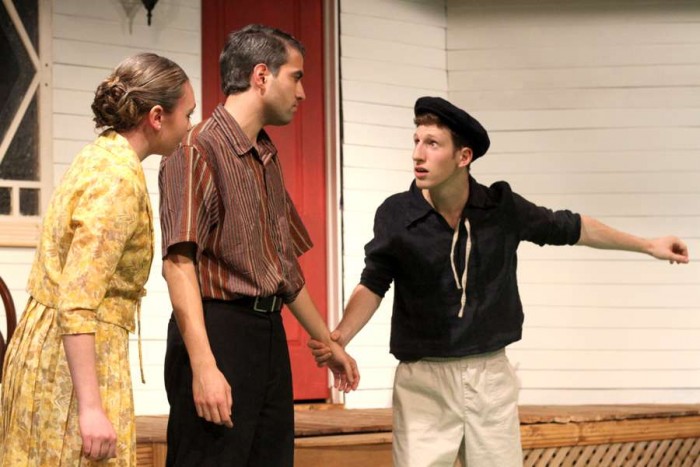The ‘dystopian suburban soap opera’ has become somewhat of a cliché in recent years. Between Alan Ball’s film American Beauty, Tracy Letts’s play August: Osage County, and David Chase’s television series The Sopranos, writers have managed to wring an impressive amount of drama out of debunking the American Dream. Legendary playwright Arthur Miller provided them a marvelous template to work from with his play All My Sons, currently being performed by the McGill Players’ Theatre.
Director Matthieu Labaudinière emphasizes the American setting of the play immediately with the Tin Pan Alley-era jazz that plays as the house lights dim. As the stage lights come up, we are exposed to American suburbia through the set’s white picket fence, bright red door, and lone rocking chair. Set designer Patrick Higdon also places dead rose petals around the stage and strewn tree branches at its centre to hint at the dark side of the seemingly idyllic world Miller will soon reveal.
The tree branches represent a central motif in the drama. The Kellers plant the tree to which the branches belong in honour of their son Larry, an air force pilot who has been missing in action for three years. As the play opens, Joe Keller (Oren Lefkowitz) and his neighbours Jim Bayliss (Ben Mayer-Goodman) and Frank Lubey (John Hanchar) discuss the fallen tree and the effect it will have on Joe’s wife Kate (Julianna Astorino), who clings to the notion that Larry still might be alive.
The Kellers’ other son, Chris (Matt Smith), is introduced shortly, and here we begin to see Miller wrestle with issues of class and education. As Joe peruses a copy of the local paper, Chris asks to read the book review section. Joe scoffs at Chris’s desire to be educated, and Chris shows an equal disdain towards his father’s philistinism.
Miller continues to probe the depths of these issues as we learn more about the characters. Joe owns a local factory that produces aircraft machinery. Chris, on the other hand, aspires to use his education to escape blue-collar life. The tension between these two philosophies forms a central pillar of the drama.
Much of the play’s interest derives from the relationships between these men and the two most prominent female characters, Kate, and their former next-door-neighbour, Ann Deever (Noush Kadian). Ann comes to visit for the first time since Larry, her former lover, went missing. We soon understand her motivations, as she and Chris are revealed to be romantically attached and intent upon getting married. Though Joe accepts their marriage, Kate’s attachment to Larry and her refusal to acknowledge his death prevent her from coming to terms with the relationship.
Although Miller initially presents Kate as the character who is most removed from reality, the delusions which cloud the judgements of both Chris and Joe rise to the surface as the play progresses. Both Chris’s idolization of Joe, and Joe’s refusal to admit the precariousness of the situation involving him and his ex-business partner Steve (Ann’s father) seem more and more absurd as Miller provides more information about each of the characters. By the end, we see the extent of the denial under which the three of them live under.
The complexity of these roles require the actors to embody a wide range of personas throughout the drama, and they manage (for the most part) to convey the tolls which the strife takes upon their characters. Astorino’s portrayal particularly stands out. She depicts both Kate’s initial plucky aplomb and the devastation of her self-realization to deliver a wrenching performance.
All My Sons is a deceptively complex take on the American suburban melodrama, and the Players’ Theatre has delivered a strong interpretation that deftly navigates the play’s many intricacies. Miller’s play probes issues of class, family, and war; this production makes a strong case for the continued relevance of its takes on those topics in the present day.
Though urban Montreal might sometimes feel far-removed from small-town American life, All My Sons shows the universality of the emotions it depicts.
All My Sons starts at 8 p.m. on Jan. 29—Feb. 1 at Players’ Theatre. Student tickets are $6.









